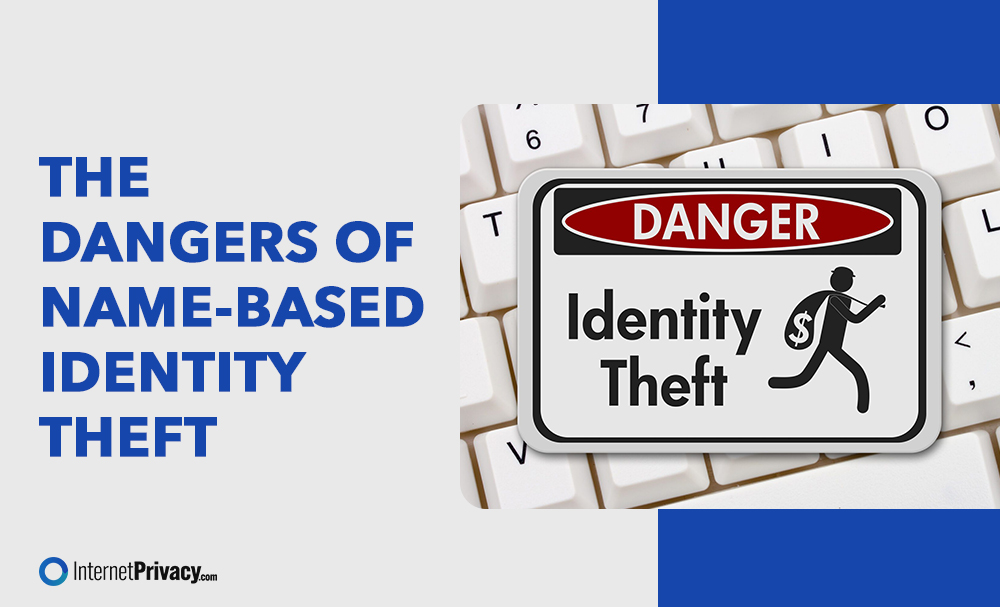The Dangers of Name-Based Identity Theft

Name-based identity theft is an increasingly prevalent concern, affecting countless individuals who fall victim to identity thieves seeking to exploit personal or financial information. This type of identity fraud occurs when someone uses another person’s name and personal details to commit fraud or other malicious activities. Understanding how this type of theft happens, recognizing the signs, and taking proactive steps to protect your information is crucial to safeguarding your identity.
What Is Name-Based Identity Theft?
Name-based identity theft occurs when someone uses your name and personal details—such as your Social Security number, date of birth, or banking information—to commit crimes. This type of theft can lead to significant financial losses, damage to your credit report, and affect your online accounts. Identity theft victims often face challenges in restoring their credit and financial stability, making it essential to report identity theft promptly.
Sensitive data is often easily accessible, whether from public records, data breaches, or through breaches on the Dark Web. Protecting your personal information is vital, and using tools like a virtual private network (VPN) and knowing your privacy rights can help keep your data safe. Additionally, knowing how identity thieves operate can help you stay one step ahead.
How Does Name-Based Identity Theft Happen?
Identity thieves use various methods to steal personal information. Some of the most common methods include:
- Phishing Scams: Fraudulent emails that appear to come from legitimate sources, tricking victims into sharing personal information such as account numbers or Social Security numbers.
- Malware: Software that secretly records keystrokes or steals sensitive data through malicious downloads or compromised websites.
- Social Engineering: Criminals impersonating trusted contacts or organizations to manipulate victims into revealing private information.
- Data Breaches: Large-scale theft of personal data from companies with insufficient cybersecurity measures, leading to inaccurate information being used for identity fraud.
To protect yourself, use strong passwords, enable two-factor authentication, and stay cautious when responding to emails or websites asking for your personal information. Regularly review your credit reports from the three major credit bureaus—Experian, TransUnion, and Equifax—to detect any suspicious activity.
Types of Name-Based Identity Theft
Name-based identity theft can take many forms, each causing significant damage. Some of the most common types include:
- Account Takeover: When someone impersonates the account holder to gain control over existing accounts and make unauthorized transactions, affecting your bank accounts and credit card number.
- Medical Identity Theft: Using another person’s information to obtain medical services, resulting in unexpected bills and healthcare complications.
- Tax-Related Identity Theft: Filing tax returns using someone else’s Social Security number, delaying refunds, and causing legal complications with the Internal Revenue Service.
These forms of identity theft can severely affect your finances, credit, and peace of mind. To reduce the risk, consider using identity monitoring services and take steps to understand how data brokers operate.
How to Identify if You’re a Victim of Name-Based Identity Theft
Detecting identity theft early can help minimize damage. If you notice any of the following signs, it may indicate that your personal information has been compromised:
- Changes in your credit report: Unfamiliar accounts or debts appear on your report, indicating fraudulent use of your identity.
- Unexpected transactions: Unexplained charges on your bank statements suggest unauthorized access to your bank account.
- Fraudulent accounts: Accounts appearing that you did not open, potentially opened by an identity thief.
Stay vigilant and act quickly if you notice these red flags. Regularly review your credit report, set up bank alerts, and stay alert for suspicious emails or communications from the fraud department of financial institutions.
Protecting Yourself from Name-Based Identity Theft
To protect yourself from identity theft, stay proactive. Here are some steps you can take:
- Use identity theft protection services: These services alert you to unusual activity tied to your personal information and provide a personal recovery plan if needed.
- Review credit reports regularly: Make sure no unfamiliar accounts have been opened in your name, and report any inaccuracies to the credit bureaus.
- Adjust privacy settings: Limit who can view your social media profiles and shared information, reducing the risk of identity thieves exploiting your data.
- Be mindful of what you share online: Avoid sharing too much personal information, especially on public platforms or with businesses you do not trust.
Using strong, unique passwords and considering two-factor authentication for added security is also essential. Place a credit freeze on your credit reports to prevent unauthorized access to your credit information.
The Consequences of Name-Based Identity Theft
The consequences of name-based identity theft go beyond financial loss. Victims often face long-lasting damage to their credit scores, which makes it harder to secure loans or credit in the future. Identity theft can also take a toll on emotional well-being, as dealing with fraud and restoring one’s identity can be overwhelming.
Financial Impact: Unauthorized transactions, fraudulent accounts, and compromised bank statements can significantly decline credit scores. Restoring credit and rectifying financial information can take months or even years, affecting your ability to gain financial advantages.
Emotional Impact: The stress of dealing with identity theft can be exhausting, especially when facing legal complications and financial instability.
What to Do If You Suspect You’re a Victim
If you think you’re a victim of name-based identity theft, act quickly. Contact your bank and credit card companies to freeze your accounts and report any suspicious transactions. Request copies of your credit reports from the three credit bureaus—Experian, TransUnion, and Equifax—and look for unfamiliar accounts or activities.
Additionally, file a report with the Federal Trade Commission (FTC) through IdentityTheft.gov. Place a fraud alert on your credit report to make it more difficult for criminals to open new accounts in your name. You may also consider placing a credit freeze to prevent anyone from accessing your credit report until your identity is secure.
Conclusion
Name-based identity theft is a serious issue that can have lasting effects on your finances, credit, and emotional well-being. By staying vigilant, using strong security measures, and monitoring your personal information, you can reduce your risk of becoming a victim. Taking action quickly when you notice signs of theft is essential to minimize damage and regain control of your identity. Utilize available resources, such as the FTC identity theft report and local police department, to ensure a comprehensive response to identity theft incidents.





